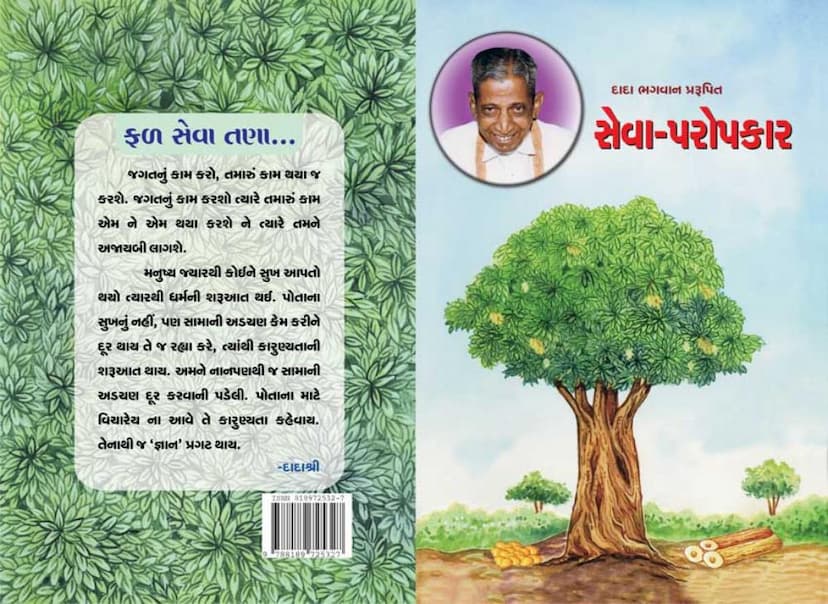Seva Paropkar
Added to library: September 2, 2025

Summary
This document is a summary of the Jain text "Seva Paropkar" by Dada Bhagwan, published by the Dada Bhagwan Foundation. The book focuses on the principles of selfless service (seva) and altruism (paropkar) as taught by Dada Bhagwan.
Here's a breakdown of the key themes and concepts discussed:
Core Philosophy of Service and Altruism:
- Serving the World Serves You: The central message is that by working for the welfare of the world, your own tasks will be accomplished automatically. This brings a sense of wonder.
- The Beginning of Dharma: True religion begins when a person starts giving happiness to others, focusing on removing obstacles for them rather than their own happiness. This is the essence of compassion.
- "I Am Nothing, I Know Nothing" Attitude: A key aspect of this philosophy is maintaining humility and a sense of not knowing, which paves the way for spiritual progress.
- Obliging Nature: The book emphasizes cultivating an "obliging nature" – a natural inclination to help others. This is presented as the foundation of spirituality.
- Giving Freely: Just as a mango tree gives its fruits without consuming them, one should give their own fruits (actions, thoughts, speech, possessions) to others. This act of giving brings inner joy and spiritual growth.
- Selfless Service is the Goal: The ultimate purpose of human life is to live for the benefit of others.
Understanding Self and the World:
- The "I" vs. "My": Dada Bhagwan differentiates between the true Self ("I") which is the Soul (Atma), absolute, and permanent, and the temporary relative possessions ("My") like body, mind, intellect, family, wealth, etc.
- The Creator of the World: The book clarifies that God is not the creator of the world in the conventional sense. The world operates through scientific circumstantial evidence and is eternal, with no single creator or operator. God resides within every living being.
- No Independent Doer: In this world, no one is an independent doer. Everyone acts as a "nimitik karta" (an agent by circumstance), relying on various conditions and combinations of factors for any action.
The Life and Teachings of Dada Bhagwan:
- Self-Realization at a Young Age: The text highlights Dada Bhagwan's (born as Ambalal Muljibhai Patel) profound spiritual experiences and insights from a young age. His questioning of conventional religious practices and his understanding of the ultimate truth are detailed.
- Akram Marg (The Pathless Path): Dada Bhagwan’s teachings are based on the "Akram Marg," a shortcut or direct path to self-realization, contrasting it with the gradual, step-by-step approach of "Kram Marg."
- Living Simply and Ethically: His life was characterized by simplicity, humility, and adherence to principles like "Dharma should not be compromised in business, but business should not be compromised in Dharma." He never took money from anyone, instead using his business earnings for the welfare of others.
- Spreading Knowledge: After his self-realization in 1958, Dada Bhagwan dedicated his life to imparting self-knowledge to thousands, guiding them towards liberation. Even after his physical departure in 1988, his teachings and spiritual energy continue to benefit the world through his chosen successor, Dr. Niruben Amin.
Practical Application of Seva and Paropkar:
- Using Mind, Speech, and Body for Others: The principle is to dedicate one's mind, speech, and body to the welfare of others. This selfless application is the "science" behind having all needs met.
- Giving Without Expectation: One should offer help without looking at whether the recipient is good or bad. The act of giving itself elevates the giver.
- The True Spirit of Service: Service should stem from an inner desire to help, not from a need for recognition or personal gain. True service is often done silently and without ego.
- Serving Parents and Elders: Special emphasis is placed on serving parents and elders, as this is considered a direct form of service and a way to attain happiness and avoid difficulties in life. Neglecting parents leads to spiritual stagnation and a lack of spiritual progress.
- The Ultimate "Product": The book explains that when one engages in service with a pure intention, material prosperity (Lakshmi) becomes a "by-product" – it comes naturally without effort. However, if the goal is purely material gain, it is not achieved.
- Serving Humanity is Serving God: While not equating service directly with worship of an idol, the text suggests that serving humanity, seeing the divine within each person, is a path that leads towards spiritual realization.
- The Goal of Life: The ultimate goal of human life is to attain self-knowledge and liberation. If this is not achieved, then living for the welfare of others is the next best purpose.
Distinguishing True Service:
- Beyond Social Service: While social service is valuable, the ultimate "world welfare" (Jagat Kalyan) is a subtler concept than social service (Samaj Kalyan).
- Nature's Law: The natural law is to give your "fruits" to others, and nature will provide for you.
- The Ego in Service: The book cautions against the ego in service. True service is done without the awareness of being a server. If ego arises, one should seek forgiveness from the Divine.
- "I" vs. "Ego": The true "I" is the soul, which is separate from the ego and its actions. The goal is to realize this separation.
- Self-Service is Universal Service: Serving oneself by realizing the true Self is the highest form of service, as it prevents causing harm to any living being.
In essence, "Seva Paropkar" guides readers to live a life of selfless service, detachment from ego, and the pursuit of self-realization, emphasizing that by working for the welfare of the world, one's own well-being and ultimate liberation are assured.